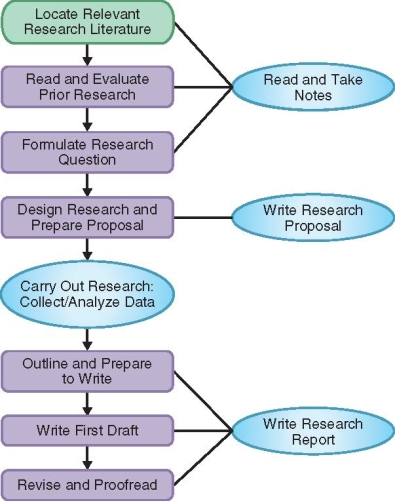Deck 14: Reading and Writing in Social Research: It's All About Communication
Question
Question
Question
Question
Question
Question
Question
Question
Question

Unlock Deck
Sign up to unlock the cards in this deck!
Unlock Deck
Unlock Deck
1/9
Play
Full screen (f)
Deck 14: Reading and Writing in Social Research: It's All About Communication
1
Which of the following sequences most accurately describes the process leading to the preparation of a research proposal?
A) Formulate research question locate relevant research literature read prior research
B) Locate relevant research literature read prior research formulate research question
C) Read prior research locate relevant research literature formulate research question
D) Locate relevant research literature formulate research question read prior research
A) Formulate research question locate relevant research literature read prior research
B) Locate relevant research literature read prior research formulate research question
C) Read prior research locate relevant research literature formulate research question
D) Locate relevant research literature formulate research question read prior research
Locate relevant research literature read prior research formulate research question
2
Reading and evaluating research reported in books may involve all but which one of the following?
A) Keeping a record of publication details such as author, title, and publication date
B) Evaluating the soundness of the methodology
C) Taking notes and asking questions about the research
D) Determining whether the book is peer reviewed
A) Keeping a record of publication details such as author, title, and publication date
B) Evaluating the soundness of the methodology
C) Taking notes and asking questions about the research
D) Determining whether the book is peer reviewed
D
3
Which of the following sections of a research report correctly matches its purpose?
A) Introduction: provides a brief overview of the research, including the major findings
B) Literature review: states why the research question is of general interest and importance
C) Methods: describes the statistical analyses performed on the data
D) Discussion: briefly restates the basic problem, findings, and limitations of the research
A) Introduction: provides a brief overview of the research, including the major findings
B) Literature review: states why the research question is of general interest and importance
C) Methods: describes the statistical analyses performed on the data
D) Discussion: briefly restates the basic problem, findings, and limitations of the research
D
4
According to the ASA Style Guide for in-text citations and references,
A) it is only necessary to cite sources that are directly quoted.
B) in-text citations should include the author(s) and year of publication.
C) all in-text citations should include relevant page numbers.
D) all in-text citations should include the names of all the authors of cited works.
A) it is only necessary to cite sources that are directly quoted.
B) in-text citations should include the author(s) and year of publication.
C) all in-text citations should include relevant page numbers.
D) all in-text citations should include the names of all the authors of cited works.

Unlock Deck
Unlock for access to all 9 flashcards in this deck.
Unlock Deck
k this deck
5
Whether a scholarly article is peer reviewed is a good indicator of its credibility.

Unlock Deck
Unlock for access to all 9 flashcards in this deck.
Unlock Deck
k this deck
6
For beginning researchers conducting small-scale projects, it may be worthwhile to replicate a previous study.

Unlock Deck
Unlock for access to all 9 flashcards in this deck.
Unlock Deck
k this deck
7
A research proposal usually differs substantially from the final research report because researchers have no idea what they will find.

Unlock Deck
Unlock for access to all 9 flashcards in this deck.
Unlock Deck
k this deck
8
The methods section of a qualitative study often provides a chronological account of the research.

Unlock Deck
Unlock for access to all 9 flashcards in this deck.
Unlock Deck
k this deck
9
Refer to the figure.
 Figure 14.2 provides a flowchart of the process of reading and writing social research. The model applies best to quantitative research. Based on your reading of Chapters 9 and 13, create a flowchart that describes the process of reading and writing as it occurs in qualitative research.
Figure 14.2 provides a flowchart of the process of reading and writing social research. The model applies best to quantitative research. Based on your reading of Chapters 9 and 13, create a flowchart that describes the process of reading and writing as it occurs in qualitative research.
 Figure 14.2 provides a flowchart of the process of reading and writing social research. The model applies best to quantitative research. Based on your reading of Chapters 9 and 13, create a flowchart that describes the process of reading and writing as it occurs in qualitative research.
Figure 14.2 provides a flowchart of the process of reading and writing social research. The model applies best to quantitative research. Based on your reading of Chapters 9 and 13, create a flowchart that describes the process of reading and writing as it occurs in qualitative research.
Unlock Deck
Unlock for access to all 9 flashcards in this deck.
Unlock Deck
k this deck


